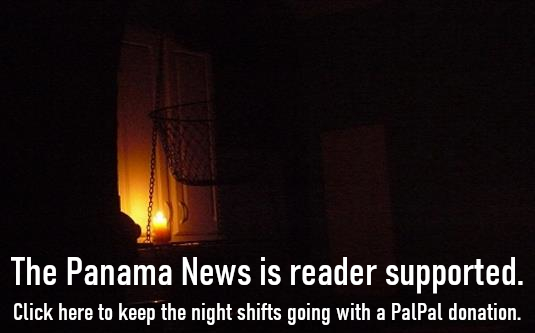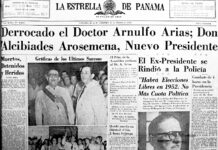“These scum, these Nicaraguans, these foreigners…” Xenophobic PRD rant draws no support from other parties as anti-immigration law gets sent back to committee.
Zulay attracts few supporters to
the gallery, no non-PRD votes
by Eric Jackson
What happened when they said that in Panama there are money launderers? Isabel Saint Malo, why didn’t you answer this?
Deputy Zulay Rodríguez, railing against Colombia’s government and
Panama’s Vice President and Foreign Minister Isabel De Saint Malo
It’s no secret for anyone in Panama that the immigration regularization program called Crisol de Razas was a good initiative that turned into one more scam for the previous administration. It’s true and it should be corrected. But when several deputies used the full legislature and its discussion of the bill that seeks to eliminate the rule that protects the program to attack the many foreigners — and in the next step their descendants — who year after year have come into the country legally and who contribute to strengthening the economy and society itself, that left much to be desired. A country like Panama, which has historically nurtured immigration and opened itself to traffic and international trade as a “crossroads the world,” can not afford this kind of attitude that’s reminiscent of noisy European ultranationalists. Panama should not tolerate discrimination on any grounds.
La Prensa’s February 26 “hoy por hoy” front page editorial
For the record, the Crisol de Razas program was a series of 14 immigration fairs initiated by the Martinelli administration at which 48,632 foreigners who were here illegally — mostly on overstayed tourist visas — legalized their residential and working status for at least the next several years without the need to surmount many of the usual bureaucratic hurdles and without the requirement to pay lawyers to file the papers. There are strong suggestions that although most of the beneficiaries were and are not committing crimes here — unless you want to characterize them living and working here as crimes — there were a few people with criminal records or other impediments to legal immigration who deceived or bribed immigration officials at the fairs to issue them the papers they wanted. President Varela ended the fairs soon after taking office.
For the record — to the extent that government statistics are reliable or at least in the ballpark — in August of last year nine percent of Panama’s prisoners were foreigners and in November of last year five percent of those arrested by Panamanian police were foreigners. Part of the discrepancy between arrests and imprisonment is that many of the foreigners in our jails and penitentiaries are awaiting trial there on drug charges, for which there is no bail in Panama.
For the record, legislator Zulay Rodríguez used to be an alternate judge, hearing cases but more importantly, through that post acting as the de facto clerk of Panama’s Supreme Court at a time when it ran rather strictly on the basis of bribery. If one wanted to deal with the magistrates, one had to go through her. Rodríguez lost her positions with the judicial system when she was fired and arrested for granting bail to Colombian drug suspects notwithstanding the ban on bail in drug cases.
In the wake of anti-foreigner complaints by mainly middle class Panamanians set off by street celebrations by members of Panama’s perhaps 300,000-strong Colombian community, a weakened PRD began to play anti-foreigner cards. Most of the public wrath was directed at Colombians and Venezuelans.
But there are more than just cosmetic and irrational grievances. Ricardo Martinelli had intended to crush the SUNTRACS construction workers union by bringing in foreign scabs and demolish the public sector doctors’ and nurses’ unions by bringing in lower-paid professionals from such countries and the Dominican Republic and Ecuador. Some of the top-paying skilled positions in the Panama Canal expansion project went to foreigners. Multinational corporations that moved their regional headquarters from Caracas to Panama City tended to take their employees with them instead of firing them all and hiring Panamanians instead.
Many of the Colombians and Venezuelans fleeing from their countries’ violence and chaos could not find legal employment with someone else and instead set up little businesses mainly catering to other members of their communities. Arepa stands, Colombian grills and kioskos sporting the colors of the Colombian and Venezuelan flags proliferated in many places.
Plus, while the isthmus long has been a major crossroads for the drug trafficking world, there have been hardly any Panamanian drug kingpins. Those major figures shift around and tend to include a lot of Colombians and Mexicans, with a rising Peruvian contingent. The foreign hit men have always been a part of these rackets. The Colombian phenomenon of control or at least the ability to tax the illegal drug trade becoming a prize to be fought over by militarized political factions has also brought the drug smuggling and money laundering operations of Colombian left-wing guerrillas and right-wing paramilitaries to Panama’s shores. The influence of the paramilitaries — Colombia’s AUC and its successors — was notable within the Moscoso, Torrijos and Martinelli administrations. Much of Panama’s upscale real estate was bought and left vacant by drug traffickers, who report back home that their illicit income is the product of rents allegedly paid for these properties that are usually either vacant or rented at much lower prices.
So along comes Zulay Rodríguez and her Proposed Law 62, to abolish the Crisol de Razas program. President Varela already did that, but it was a convenient vehicle for the PRD’s conversion into a xenophobic hate party along the lines of France’s National Front and Greece’s Golden Dawn. Every ugly stereotype about foreign criminals was mobilized in the PRD’s campaign, which has flooded the comments sections under online articles with hateful comments by mostly pseudonymous persons, many multiple avatars of the same person. (That’s precisely how Martinelli’s “Guardians of Truth” operated.)
The bill got through the legislature’s Government, Justice and Constitutional Affairs Committee on first reading. On February 23 it went before the full National Assembly. Zulay’s call to bring her supporters to the legislative palace for the occasion yielded only a couple of dozen, mostly young and mostly boisterous supporters. Representatives of Panama’s immigrant communities were excluded from the gallery. Before a mostly empty house, Zulay played an anti-immigrant regueton video and railed against foreigners. The Colombians she called “scum” but she also singled out Nicaraguans and blasted foreigners in general.
Her colleagues were not amused. On a straight party-line vote — everyone against the PRD — the proposed law was sent back to committee. The Colombian foreign ministry was not amused. A protest was forthcoming from Bogota.
Meanwhile, most countries have computerized databases of the people who have been processed by or who are wanted by their criminal justice systems. People with criminal records come into Panama as tourists every day because there is no check against such databases when coming through immigration into this country. Zulay does not propose to change that. Meanwhile, much of Panama’s real estate sector is not about actually housing anybody, but is an elaborate money laundering scheme with foreign beneficiaries. Zulay specifically denies that money laundering happens in Panama.
Why don’t more people who know better call the PRD and its demagogue on this? Part of it is that processing immigration papers is a good business for the nation’s lawyers and by and large the profession will put up with a bit of xenophobia whenever someone is attacking an immigration program that excludes them from the gravy train.
With the bill back to the committee’s drawing board, the next move will be up to committee members Zulay Rodríguez Lu, Pedro Miguel González Pinzón, Samir Gozaine Abdelmalak and Benicio E. Robinson G. of the PRD; Luis Eduardo Quirós Bernal and Jorge Iván Arrocha Rosario of the Panameñista Party; Cambio Democratico’s Rubén Darío Frías Ortega and Manuel Cohen Salerno; plus the legislature’s independent deputy, Ana Matilde Gómez Ruiloba.
Contact us by email at fund4thepanamanews@gmail.com
To fend off hackers, organized trolls and other online vandalism, our website comments feature is switched off. Instead, come to our Facebook page to join in the discussion.
These links are interactive — click on the boxes












